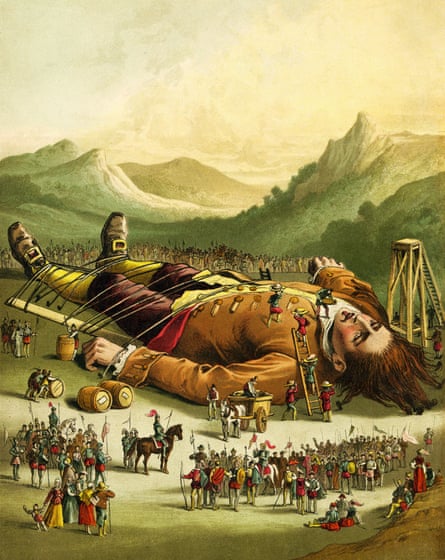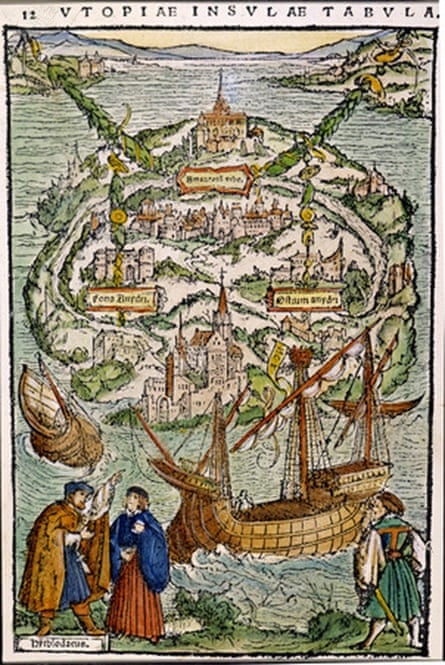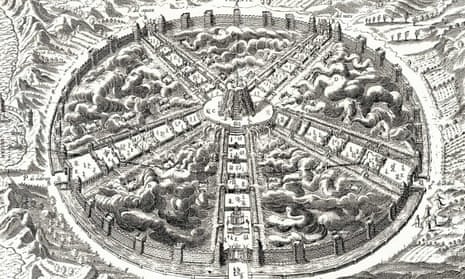Thomas More’s Utopia, a book that will be 500 years old next year, is astonishingly radical stuff. Not many lord chancellors of England have denounced private property, advocated a form of communism and described the current social order as a “conspiracy of the rich”. Such men, the book announces, are “greedy, unscrupulous and useless”. There are a great number of noblemen, More complains, who live like drones on the labour of others. Tenants are evicted so that “one insatiable glutton and accursed plague of his native land” may consolidate his fields. Monarchs, he argues, would do well to swear at their inauguration never to have more than 1,000lbs of gold in their coffers. Perhaps this is one reason why Utopia is not bedside reading in Buckingham Palace. Instead of being worshipped, gold and silver should, he suggests, be used to make chamber pots. War is fit only for beasts, and standing armies should be disbanded. Labour should be reduced to a minimum, though the TUC might balk at the suggestion that workers would use some of their leisure time to attend public lectures before daybreak.
Not all More’s proposals would delight the heart of Jeremy Corbyn. The perfection of his utopia is not tarnished in his view by the fact that it contains slaves. On certain festive days wives would fall down at their husbands’ feet, confessing that they have performed some domestic duty negligently. Adultery would be punished by the strictest form of slavery. One should recall that More, far from being the liberal-cum-existentialist portrayed in Robert Bolt’s play A Man for All Seasons, showed not the slightest compunction in torturing and executing heretics. In choosing one’s mate, men should be allowed to see their prospective wives naked, since who wants goods that aren’t on show? Feminists, however, should note that women would enjoy the same prerogative. Brothels would be abolished, but so would alehouses. There would be no lawyers (a generous-hearted proposal, since More was one himself), but no tolerance for those who waste time, either.
More’s book, in some ways a work of early science fiction, gave rise to a whole new genre of writing. Judging from that literature, there are really two kinds of utopia. There are carnivalesque societies in which, instead of working, everyone will drink, feast and copulate from dawn to dusk. In one such 18th-century fantasy, men and women bereft of all body hair leap naked into fountains, while the progressively minded narrator watches on. Whether his pleasure is entirely theoretical remains unclear.
There are also more austere utopias, in which everything is odourless and antiseptic, intolerably streamlined and sensible. In these meticulously planned countries of the mind, the natives tend to jaw on for hours about the efficiency of their sanitary arrangements or the ingenuity of their electoral system. Daniel Defoe’s Robinson Crusoe is in some ways an exercise of this kind, as Crusoe, marooned on a desert island, potters about, chopping wood and staking out his enclosure as if he were in the home counties. It is reassuring to see him practising a very English rationality in such exotically unfamiliar circumstances. More’s fantasy is an odd mixture of both visions, rational and libidinal. On the one hand, his ideal society is a high-minded, fairly puritanical place, one likely to appeal to the stereotypical Hampstead vegetarian; on the other hand, its inhabitants are genial, laid-back and agreeably disinclined to do much work.
Alternative universes are really devices for embarrassing the present, as imaginary cultures are used to estrange and unsettle our own. As such, they have been largely the product of the left. The finest of all such works in Britain is the Marxist William Morris’s News from Nowhere, one of the very few utopian visions to offer a detailed account of how the political transformation actually came about. Meanwhile, a hard-nosed anti-utopian right has scoffed at the unreality of such proposals, rather like the Daily Mail on the new Labour leader. The word “utopia” means “nowhere”, but it isn’t clear whether this is because the place could exist but happens not to, or whether it is nowhere in much the same sense that a humble Richard Dawkins or a coy Chris Evans is.

Swift’s Gulliver’s Travels is one such rightwing polemic. Tories like Swift, who regard human beings as feeble and corrupt, fear that nothing but chaos and confusion can result from the grandiose schemes of the progressivists. If men and women are encouraged to hope unrealistically, they can only end up damaged and disenchanted. Gulliver himself is finally driven mad, seduced by an impossible ideal. In this satire of idle dreaming, alien creatures from distant lands are shown to be depressingly like ourselves. The natives of Lilliput are petty, vicious, quarrelsome and sectarian. When the hero finally encounters a race of noble-minded creatures, they turn out to be horses.
To portray the future in the language of the present may well be to betray it. A truly radical change would defeat the categories we currently have to hand. If we can speak of the future at all, it follows that we are still tied to some extent to the present. This is one reason why Marx, who began his career in contention with the middle-class utopianists, steadfastly refused to engage in future-talk. The most a revolutionary could do was to describe the conditions under which a different sort of future might be possible. To stipulate exactly what it might look like was to try to programme freedom. If Marx was a prophet, it was not because he sought to foresee the future. Prophets – Old Testament ones, at least – aren’t clairvoyants. Rather than gaze into the future, they warn you that unless you feed the hungry and welcome the immigrant, there isn’t going to be one. Or if there is, it will be deeply unpleasant. The real soothsayers are those hired by the big corporations to peer into the entrails of the system and assure their masters that their profits are safe for another 30 years. We live in a world that seeks to extend its sovereignty even over what doesn’t yet exist.
Radicals thus find themselves under fire from opposite directions. If they refuse to debate what kind of cultural policies might flourish under socialism, for example, they are being shifty; if they hand you a thick bunch of documents on the question, they are guilty of blue-printing. Perhaps it is impossible to draw a line between being too agnostic about the future and being too assured about it. The Marxist philosopher Walter Benjamin reminds us that the ancient Jews were forbidden to make icons of what was to come, rather as they were forbidden to fashion graven images of Yahweh. The two prohibitions are closely related, since for the Hebrew scriptures, Yahweh is the God of the future, whose kingdom of justice and friendship is still to come. Besides, the only image of God for Judaism is human flesh and blood. For Benjamin, seeking to portray the future is a kind of fetishism. Instead, we are driven backwards into this unexplored territory with our eyes fixed steadily on the injustice and exploitation of the past. Knowing exactly where we are going is the surest way of not getting there. In any case, the energies we invest in envisaging a better world might consume the energies we need to create it.
Marx had no interest in human perfection. There is nothing in his work to suggest that post-capitalist societies would be magically free of predators, psychopaths, free-loaders, Piers Morgan-types or people who stow their luggage on aircraft with surreal slowness, indifferent to the fact that there are 50 people queuing behind them. The idea that history is moving ever onwards and upwards is an invention of the middle-class Enlightenment, not of the left.

Marx, however, was aware that there are two kinds of starry-eyed idealist. There are those like the French 19th-century thinker Charles Fourier, who looked forward to a future in which the sea would turn into lemonade, and whose ideal social unit consisted of exactly 1,620 people. Then there is the other bunch of wild-eyed idealists who hold that the future will be pretty much like the present. Those with their heads truly in the clouds are the hard-headed pragmatists who seem to assume that Mars bars and the International Monetary Fund will still be with us in 500 year’s time. Our system is run by a set of dreamers who call themselves realists. To expect the future to be different is not of course to maintain that it will be better. It might be a great deal worse. The point is that history is malleable enough for us to choose. No sooner had the political theorists of the 1990s proclaimed that history was at an end than two aircraft slammed into the World Trade Center, and a whole new historical narrative began to unfold. History may not have been improved by this development, but it certainly didn’t stand still.
All true utopianists do themselves out of a job. The only place where there is no need for utopian thought is in utopia, a country that Oscar Wilde considered every genuine map of the world should contain. There will be no need for feminists once patriarchy and sexism are dim memories of a benighted past. Until then, critics of the present must remain properly otherworldly, despite the taunts of their political opponents. They must refuse the transparent falsehood that the world we see around us is the best we can muster. Bad forms of utopianism simply tack a fantasy on to actuality, making an idol out of the future. Conservatives, by contrast, are in danger of consecrating the present. The best kind of utopian thought rejects both of these cases. Instead, it holds present and future in tension by pointing to those forces active in the present that might lead beyond it.
As a man of his time, Thomas More did not think in such terms. He did not share the modern conception of history as constant change, and looking back at his great treatise one is tempted to suggest that in some ways he was right not to do so. For one of Utopia’s most striking aspects is its contemporaneity – the way in which the greedy, unscrupulous and useless are just as much in evidence now as in 1516. The conspiracy of the rich has lasted an extraordinarily long time.

Comments (…)
Sign in or create your Guardian account to join the discussion